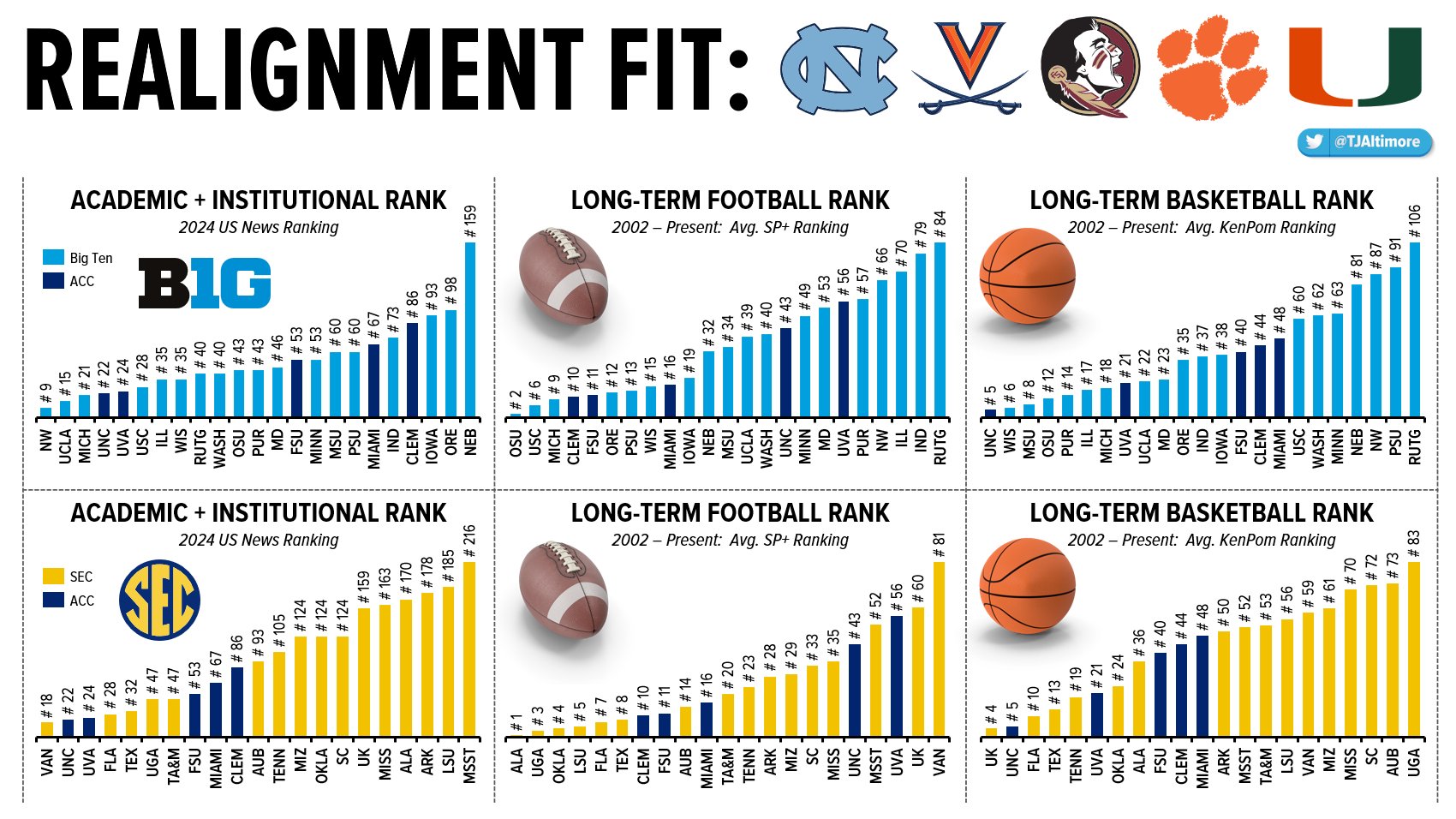We've got plenty of threads on the Bama/FSU situation, so let's pivot to the conversation of play-offs in general.
From an Iowa article today: Call me old and out of touch, but I sure preferred the old bowl system where about a half-dozen high profile programs played meaningful post-season games with the goal of being declared the nation’s best. Sure, arguments ensued afterward, but that was part of the fun too. Now, it’s just an ESPN/Disney/SEC/Big 10 money grab and it’s quite off-putting.
I’ve said it before and I’ll keep repeating it until I no longer have a platform: college football is at its very best and most entertaining when it’s centered on regional rivalries and historical grudge matches, with the post-season serving as an opportunity to state your case for supremacy against a program you’d otherwise almost never face. Now, the regular season is essentially meaningless and west coast teams are in east coast conferences. I’ll still watch, but something fundamental has been lost. ~From Tuesdays with Torbe by Tory Brecht
Though next year’s 12-team format will get more teams involved, the ramifications of an expanded field could dilute some of the sport’s most compelling aspects.
For decades, college football’s playoff lobbyists screamed that they just wanted an undisputed national champion determined on the field. The College Football Playoff is about to do that once again, while mostly preserving the integrity of the best regular season in sports. Naturally, the CFP will expand to 12 teams next year anyway, to chase two American obsessions: massive playoffs and revenue.
You would think that after roughly a century of people screaming for a nice big playoff, college football would be ready. It is not. Next year’s format is going to cause a lot more screaming than people realize, because the system is built around the money grab known as conference championship games.
Let’s start here with an obvious point: With a 12-team Playoff, last week’s Michigan–Ohio State game and this weekend’s Oregon-Washington Pac-12 title game would be for Playoff positioning rather than likely Playoff elimination. That would dilute the meaning of rivalry games; the only question is by how much.
The 12-team CFP addressed this proactively by promising that the top four Playoff seeds (and accompanying byes) will go to conference champions, which was smart. But that was before the latest wave of realignment radically changed the structure and purpose of conferences.
Next year, the Big Ten and SEC will no longer be collections of the best teams from a region. They will be 18- and 16-team conglomerates. There are many ramifications to that, but the one that is relevant to the CFP is that when leagues are that large and the season is this short, it is very hard to create an equitable format for producing a conference champion.
The Big Ten and SEC have chosen rotating schedules with certain fixed games to preserve rivalries. There will be no divisions. The top two teams in each conference will play in the conference championship games.
It all sounds good. But look at the 2024 schedules. LSU will not have to play Georgia or Texas, and its four road games will be against three teams that finished sub.-500 this year (Florida, South Carolina and Arkansas) and another (Texas A&M) that fired its coach. Meanwhile, Georgia has road games against Alabama, Texas and Ole Miss.
In its first Big Ten season, UCLA won’t play Michigan or Ohio State. Wisconsin won’t play Michigan, Ohio State or Washington.
In 2025, Iowa will not play Michigan, Ohio State or Washington. USC will not play Ohio State, Washington or Penn State.
Of course some schedules that look easy now will end up being brutal and vice versa. But when leagues are this large, scheduling imbalance is inevitable. That means that the third- or fourth-best teams in the Big Ten and SEC will make the conference championship games fairly regularly. This happens now, too—Iowa will play Michigan on Saturday, after all—but it will mean a lot more next year, because there will be automatic byes at stake.
Relying on conference “championship games” when teams face only half their league is a lousy way to set a playoff bracket. The NFL also rewards division champions, and the strength of NFL schedules vary—but one of the biggest complaints about the league’s playoff format is that division champions automatically get top-four seeds, and, anyway, each team in a division plays the others twice.
There are other problems with next season’s CFP. If the 2024 format had been in place this year, Michigan and Ohio State would have clinched a rematch in the Big Ten championship game before playing each other in Ann Arbor. Winning the conference title game would guarantee a top-four seed. Losing The Game and the conference championship game would lead to a spot in the Playoff. If Ohio State had beaten Michigan by four touchdowns in Ann Arbor, then lost to Michigan in overtime on a neutral field, Michigan would get the better Playoff seed and the bye.
Suggesting that Michigan and Ohio State rest their starters against each other sounds like heresy. But sitting out the Rose Bowl was unthinkable once, too, and now players do it all the time. What happens when the system also rewards teams for resting starters?
Historically, Michigan and Ohio State have rarely been undefeated when they face each other. But what happens when Alabama clinches a conference-title game spot before the Iron Bowl?
Last week’s Florida–Florida State game was riveting because it was almost certainly a Playoff elimination game for unbeaten FSU. But under the new format, Florida State would have essentially clinched a spot in the Playoff before the Florida game, and its only chance to clinch a CFP bye would be to win the ACC title game.
Part of college football’s allure has always been that the national championship is on the line each Saturday, and that becomes more true with each passing week. The new format will turn some high-stakes games into low-stakes games, leaving coaches and players with some risk/reward questions that are unprecedented in the sport.
How can the CFP address this? One possibility is to eliminate the conference title games entirely and pick the field like the NCAA basketball tournament selection committees do: based on an evaluation of how a team played over the course of the season. But that would require conferences to give up their title-game revenue. It would also divorce conference titles from the process of determining a national champion, and I don’t think any of college football’s power brokers is comfortable with that.
Another, better solution: rotating divisions. The Big Ten would split into two fresh nine-team divisions, and the SEC would split into two fresh eight-team divisions each year. Divisions would be balanced based on the previous season’s standings, though rivalry games would be protected, so Michigan and Ohio State (or USC and UCLA, or Auburn and Alabama, or Ole Miss and Mississippi State) would always be in the same division. Big Ten teams would play an eight-game conference schedule against the other teams in their division; SEC teams would play seven games against other teams in their division and one or two against a team from the other division. Then the two division champions would play each other in the conference title game. The CFP would still reserve its top four spots for conference champions.
That way, rivals could not play each other two weeks in a row. If Michigan and Ohio State are undefeated in late November, only the winner of The Game could win the conference and get a CFP bye. Those games would be as meaningful as they could possibly be in a sport with a 12-team Playoff.
I acknowledge that changing the makeup of divisions every year seems chaotic and confusing, but hey, putting Rutgers and Oregon in the same conference wasn’t my idea. The end result would be more orderly and sensible than what we will see in 2024. There have been so many changes in college football in the last few years, but with a 12-team Playoff coming, the sport needs at least one more.
https://www.si.com/college/2023/11/29/new-college-football-playoff-format-12-teams-add-to-chaos
From an Iowa article today: Call me old and out of touch, but I sure preferred the old bowl system where about a half-dozen high profile programs played meaningful post-season games with the goal of being declared the nation’s best. Sure, arguments ensued afterward, but that was part of the fun too. Now, it’s just an ESPN/Disney/SEC/Big 10 money grab and it’s quite off-putting.
I’ve said it before and I’ll keep repeating it until I no longer have a platform: college football is at its very best and most entertaining when it’s centered on regional rivalries and historical grudge matches, with the post-season serving as an opportunity to state your case for supremacy against a program you’d otherwise almost never face. Now, the regular season is essentially meaningless and west coast teams are in east coast conferences. I’ll still watch, but something fundamental has been lost. ~From Tuesdays with Torbe by Tory Brecht
New College Football Playoff Format Will Only Add to the ChaosThough next year’s 12-team format will get more teams involved, the ramifications of an expanded field could dilute some of the sport’s most compelling aspects.
For decades, college football’s playoff lobbyists screamed that they just wanted an undisputed national champion determined on the field. The College Football Playoff is about to do that once again, while mostly preserving the integrity of the best regular season in sports. Naturally, the CFP will expand to 12 teams next year anyway, to chase two American obsessions: massive playoffs and revenue.
You would think that after roughly a century of people screaming for a nice big playoff, college football would be ready. It is not. Next year’s format is going to cause a lot more screaming than people realize, because the system is built around the money grab known as conference championship games.
Let’s start here with an obvious point: With a 12-team Playoff, last week’s Michigan–Ohio State game and this weekend’s Oregon-Washington Pac-12 title game would be for Playoff positioning rather than likely Playoff elimination. That would dilute the meaning of rivalry games; the only question is by how much.
The 12-team CFP addressed this proactively by promising that the top four Playoff seeds (and accompanying byes) will go to conference champions, which was smart. But that was before the latest wave of realignment radically changed the structure and purpose of conferences.
Next year, the Big Ten and SEC will no longer be collections of the best teams from a region. They will be 18- and 16-team conglomerates. There are many ramifications to that, but the one that is relevant to the CFP is that when leagues are that large and the season is this short, it is very hard to create an equitable format for producing a conference champion.
The Big Ten and SEC have chosen rotating schedules with certain fixed games to preserve rivalries. There will be no divisions. The top two teams in each conference will play in the conference championship games.
It all sounds good. But look at the 2024 schedules. LSU will not have to play Georgia or Texas, and its four road games will be against three teams that finished sub.-500 this year (Florida, South Carolina and Arkansas) and another (Texas A&M) that fired its coach. Meanwhile, Georgia has road games against Alabama, Texas and Ole Miss.
In its first Big Ten season, UCLA won’t play Michigan or Ohio State. Wisconsin won’t play Michigan, Ohio State or Washington.
In 2025, Iowa will not play Michigan, Ohio State or Washington. USC will not play Ohio State, Washington or Penn State.
Of course some schedules that look easy now will end up being brutal and vice versa. But when leagues are this large, scheduling imbalance is inevitable. That means that the third- or fourth-best teams in the Big Ten and SEC will make the conference championship games fairly regularly. This happens now, too—Iowa will play Michigan on Saturday, after all—but it will mean a lot more next year, because there will be automatic byes at stake.
Relying on conference “championship games” when teams face only half their league is a lousy way to set a playoff bracket. The NFL also rewards division champions, and the strength of NFL schedules vary—but one of the biggest complaints about the league’s playoff format is that division champions automatically get top-four seeds, and, anyway, each team in a division plays the others twice.
There are other problems with next season’s CFP. If the 2024 format had been in place this year, Michigan and Ohio State would have clinched a rematch in the Big Ten championship game before playing each other in Ann Arbor. Winning the conference title game would guarantee a top-four seed. Losing The Game and the conference championship game would lead to a spot in the Playoff. If Ohio State had beaten Michigan by four touchdowns in Ann Arbor, then lost to Michigan in overtime on a neutral field, Michigan would get the better Playoff seed and the bye.
Suggesting that Michigan and Ohio State rest their starters against each other sounds like heresy. But sitting out the Rose Bowl was unthinkable once, too, and now players do it all the time. What happens when the system also rewards teams for resting starters?
Historically, Michigan and Ohio State have rarely been undefeated when they face each other. But what happens when Alabama clinches a conference-title game spot before the Iron Bowl?
Last week’s Florida–Florida State game was riveting because it was almost certainly a Playoff elimination game for unbeaten FSU. But under the new format, Florida State would have essentially clinched a spot in the Playoff before the Florida game, and its only chance to clinch a CFP bye would be to win the ACC title game.
Part of college football’s allure has always been that the national championship is on the line each Saturday, and that becomes more true with each passing week. The new format will turn some high-stakes games into low-stakes games, leaving coaches and players with some risk/reward questions that are unprecedented in the sport.
How can the CFP address this? One possibility is to eliminate the conference title games entirely and pick the field like the NCAA basketball tournament selection committees do: based on an evaluation of how a team played over the course of the season. But that would require conferences to give up their title-game revenue. It would also divorce conference titles from the process of determining a national champion, and I don’t think any of college football’s power brokers is comfortable with that.
Another, better solution: rotating divisions. The Big Ten would split into two fresh nine-team divisions, and the SEC would split into two fresh eight-team divisions each year. Divisions would be balanced based on the previous season’s standings, though rivalry games would be protected, so Michigan and Ohio State (or USC and UCLA, or Auburn and Alabama, or Ole Miss and Mississippi State) would always be in the same division. Big Ten teams would play an eight-game conference schedule against the other teams in their division; SEC teams would play seven games against other teams in their division and one or two against a team from the other division. Then the two division champions would play each other in the conference title game. The CFP would still reserve its top four spots for conference champions.
That way, rivals could not play each other two weeks in a row. If Michigan and Ohio State are undefeated in late November, only the winner of The Game could win the conference and get a CFP bye. Those games would be as meaningful as they could possibly be in a sport with a 12-team Playoff.
I acknowledge that changing the makeup of divisions every year seems chaotic and confusing, but hey, putting Rutgers and Oregon in the same conference wasn’t my idea. The end result would be more orderly and sensible than what we will see in 2024. There have been so many changes in college football in the last few years, but with a 12-team Playoff coming, the sport needs at least one more.
https://www.si.com/college/2023/11/29/new-college-football-playoff-format-12-teams-add-to-chaos






